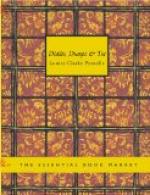“Yes, sar!” he was saying, as if arguing with somebody. “Yes, sar, by rights dat nigger gal oughter be beat mos’ ter deff, she clean bodder de life out’n me, an’ marster, he jes’ oughter kill dat nigger. I dunno w’at makes me kyar so much er bout’n her no way; dar’s plenty er likelier gals ‘n her, an’ I jes’ b’lieve dat’s er trick nigger; anyhow she’s tricked me, sho’s yer born; an’ ef’n I didn’t b’long ter nobody, I’d jump right inter dis creek an’ drown myse’f. But I ain’t got no right ter be killin’ up marster’s niggers dat way; I’m wuff er thousan’ dollars, an’ marster ain’t got no thousan’ dollars ter was’e in dis creek, long er dat lazy, shif’less, good-fur-nuffin’ yaller nigger.”
The poor fellow’s dejected countenance and evident distress enlisted the sympathy of his mistress, and thinking that any negro who took such good care of his master’s property would make a good husband, she sought an interview with Candace, and so pleaded with her in behalf of poor Jim that the dusky coquette relented, and went down herself to Aunt Sukey’s cabin to tell her lover that she did love him all along, and was “jis’ er projeckin’ wid ’im,” and that she would surely marry him Christmas-night.
Their master had had a new cabin built for them, and their mistress had furnished it neatly for the young folks to begin housekeeping, and in mamma’s wardrobe was a white dress and a veil and wreath that were to be the bride’s Christmas gifts. They were to be married in the parlor at the house, and dance afterwards in the barn, and the wedding supper was to be set in the laundry.
So you see it was a busy day, with so much of cake-baking and icing and trimming to be done; and then the girls had to see about their dresses for the evening, and the young men had their shoes to black, and their best clothes to brush, and their hair to unwrap; but, notwithstanding all this, when Major Waldron and his family entered the chapel they found a large congregation assembled; indeed, all were there except the sick; and master and slaves, the white children and black, united their hearts and voices to
“Laud and magnify His holy name,”
and to return thanks to God for his great Christmas gift of a Saviour to the world.
As they were leaving the chapel after service, Dumps drew close to her mother and whispered,
“Mamma, bein’ as this is Chris’mas, an’ it’s rainin’, can’t we have some of the little quarter niggers to go to the house and play Injuns with us?”
Mamma was about to refuse, for the little girls were not allowed to play with the quarter children; but Dumps looked very wistful, and, besides, Mammy would be with them in the nursery, so she consented, and each of the children were told that they might select one of the little negroes to play with them.
Diddie took a little mulatto girl named Agnes. Dumps had so many favorites that it was hard for her to decide; but finally she selected Frances, a lively little darky, who could dance and pat and sing and shout, and do lots of funny things.




